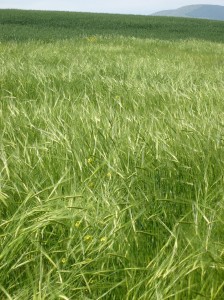The Day of the Wave Sheaf Offering or First Fruits Day
In Hebrew roots circles, a day has gained prominence for celebrating the resurrection of Yeshua. It is called by many, the Feast of First Fruits or simply First Fruits. In several books published by Messianic or Hebrew roots teachers, this day has been elevated to the status as one of the “feasts” of YHVH on a par with Passover, Unleavened Bread, Pentecost, Trumpets, Atonement and Tabernacles. In creating a special designation for this day—one, as we shall see later, that Scripture does not give it—most of these teachers curiously omit the last of YHVH’s seven “feasts” or miqra-ee kodesh (commanded assemblies); namely, The Eighth Day or Shemini Atzeret. This festival is a Sabbath and immediately falls after the Feast of Tabernacles. It has important spiritual significance and represents the formation of the New Heaven and New Earth and the descent of the New Jerusalem after the end of the 1000-year long Millennium on earth. It literally represents heaven-on-earth for eternity. It is, therefore, a shame to omit this most important festival of YHVH!
The Nature of the Omer Offering/Service
Does the omer offering on “Wave Sheaf Sunday” prophetically point to and foretell the death and/or resurrection of Yeshua, and if so, how? First, let us look at the scriptural passages that speak of this day.
Leviticus 23:10–17, Speak unto the children of Israel, and say unto them, When you be come into the land which I give unto you, and shall reap the harvest thereof, then you shall bring a sheaf of the first fruits [reshiyth] of your harvest unto the priest: And he shall wave the sheaf before YHVH, to be accepted for you: on the morrow after the Sabbath the priest shall wave it. And you shall offer that day when you wave the sheaf an he lamb without blemish of the first year for a burnt offering unto YHVH. And the grain offering thereof shall be two tenth deals of fine flour mingled with oil, an offering made by fire unto YHVH for a sweet savor: and the drink offering thereof shall be of wine, the fourth part of an hin. And you shall eat neither bread, nor parched corn, nor green ears, until the selfsame day that you have brought an offering unto your Elohim: it shall be a statute for ever throughout your generations in all your dwellings. And you shall count unto you from the morrow after the Sabbath, from the day that you brought the sheaf [omer] of the wave offering; seven sabbaths shall be complete: Even unto the morrow after the seventh Sabbath shall you number fifty days; and you shall offer a new meat offering unto YHVH. You shall bring out of your habitations two wave loaves of two tenth deals: they shall be of fine flour; they shall be baked with leaven; they are the first fruits [bikkurim] unto YHVH.
Leviticus 23:10b–14a, … you are to bring the premier sheaf of your harvest to the priest. He is to elevate the sheaf before the presence of YHVH, for acceptance for you; on the morrrow after the Sabbath the priest is to elevate it. You are to perform a sacrifice on the day of your elevating the sheaf: a sheep, wholly-sound, in its (first) year, as an offering-up to YHVH, and its grain-gift: two tenth-measures of flour mixed with oil, a fire-offering to YHVH, a soothing savour; and its poured-offering of wine: a fourth of a hin. Now bread, parched-grain or groats, you are not to eat, until that same day, until you have brought the near-offering of our Elohim… (The Shocken Bible)
Leviticus 2:12–16, As for the offering of the first fruits, you shall offer them to YHVH, but they shall not be burned on the altar for a sweet aroma. And every offering of your grain offering you shall season with salt; you shall not allow the salt of the covenant of your God to be lacking from your grain offering. With all your offerings you shall offer salt. And if you offer a meal offering of thy first fruits [bikkurim] unto YHVH, you shall offer for the meal offering of thy first fruits [bikkurim] green ears [abib, H24, or green in the ears barley] of corn [qalah; H7033, roasted dried, burned, parched grain] dried by the fire, even corn beaten [geres; H1643, crushed grain or groats] out of full ears. And you shall put oil upon it, and lay frankincense thereon: it is a meat offering. And the priest shall burn the memorial of it, part of the beaten corn thereof, and part of the oil thereof, with all the frankincense thereof: it is an offering made by fire unto YHVH.
The Order of Events Associated With the Waving of the Omer
Now that we have the scriptural passages before us pertaining to the First Fruits Day, let’s list in chronological order the events and ceremonies that occurred on this day involving both the Israelite farmer and the priest.


